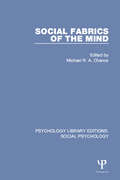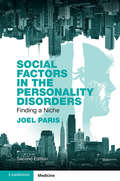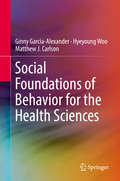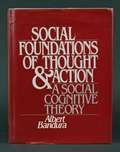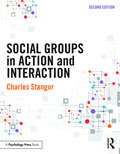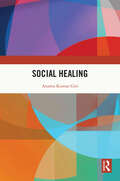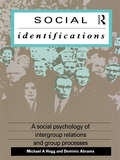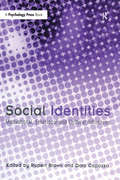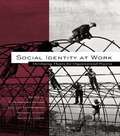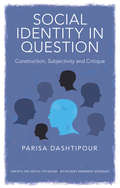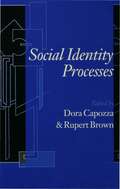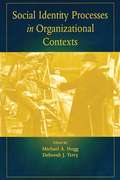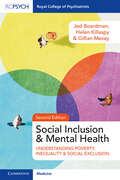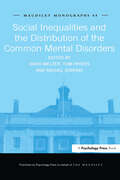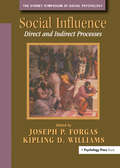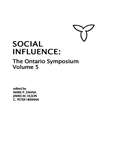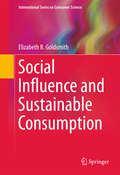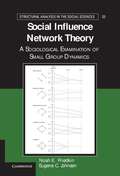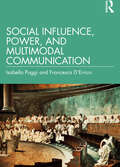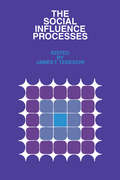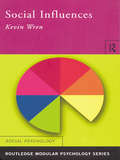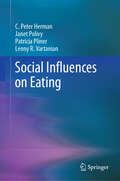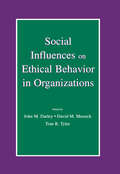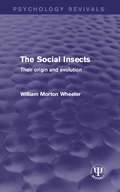- Table View
- List View
Social Fabrics of the Mind (Psychology Library Editions: Social Psychology #7)
by Michael R.A. ChanceOriginally published in 1988, this book outlines a new evolutionary paradigm for understanding human society and mental structure, originating from the editor's work in primate ethology. It is supported and further elaborated by the contributors. Chance argues that two modes of social interaction, the agonic and hedonic, underlie social life and corresponding mentality. In the agonic mode we are concerned with self-security and our attention is much taken up with being accepted by a group. This mode is based on a recently discovered state of inhibited (braked) mental arousal. Social behaviour is either authoritarian or authority subservient, and has a tendency to control or be controlled. It curbs intelligence and restricts personality development. In the hedonic mode we are freer to form a network of personal relationships that are typically mutually supportive. The hedonic mode leads to the development of self-confidence and a relaxed empathic and collaborative personality with intelligence enhanced. The volume will still be of interest to all concerned with human affairs including those working in ethology, primatology, anthropology, social psychology, psychiatry and political sociology.
Social Factors in the Personality Disorders: Finding a Niche (Studies In Social And Community Psychiatry Ser.)
by Joel ParisStudies reveal that nearly 10% of the adult population meet criteria for an official diagnosis of personality disorder. Personality disorders have been shown to be strongly influenced by biological and psychological factors, however, less attention has been paid to the social context of these disorders. Synthesizing over 25 years of research since the first edition, this book explores how certain social forces can amplify heritable traits into disorders. It considers these interactions in the framework of a broad biopsychosocial model. Chapters cover clinically important categories, including borderline, narcissistic, and antisocial personality, as well as topics such as modernity, exploring how rapid social change is acting as a major risk factor for these disorders. Concise, balanced, and evidence-based throughout, this important book offers a unique perspective and shows how this can inform treatment decisions for all mental health professionals. It will also be of interest to researchers in the social sciences.
Social Foundations of Behavior for the Health Sciences
by Ginny Garcia-Alexander Hyeyoung Woo Matthew J. CarlsonThis textbook helps students in the health sciences prepare for the social foundations portion of the Medical College Admission Test (MCAT). It provides a solid understanding of the fundamental concepts, theories, and methodologies in sociology that the MCAT exam requires. This book offers a condensed overview of the sociological concepts covered during a 15 week semester. It helps students gain an understanding of the social foundations of behavior, and the social determinants of health within the professional context of medicine. Students are provided with the necessary basics in addition to case studies, learning and research activities, recommended external resources, and study questions. These are meant to develop pre-health students' understanding of the importance of the social factors that influence health outcomes. The featured activities contain various exercises using examples of sociology of health and medicine, including social factors shaping health, social relations between doctors and patients, and the health care system, among others. As a result, this book well informs not only those who wish to prepare for the MCAT to pursue a career in the health profession, but also anyone who is interested in social perspectives on health and medicine.
Social Foundations Of Thought And Action: A Social Cognitive Theory (Prentice-hall Series In Social Learning Theory)
by Albert BanduraPresents a comprehensive theory of human motivation and action from a social-cognitive perspective. This insightful text addresses the prominent roles played by cognitive, vicarious, self-regulatory, and self-reflective processes in psychosocial functioning; emphasizes reciprocal causation through the interplay of cognitive, behavioral, and environmental factors; and systematically applies the basic principles of this theory to personal and social change.
Social Groups in Action and Interaction: 2nd Edition (Psychology Ser.)
by Charles StangorSocial Groups in Action and Interaction reviews and analyzes the human group as it operates to create both social good and, potentially, social harm. It summarizes current knowledge and contemporary research, with real-world examples in succinct yet engaging chapters, to help students understand and predict group behavior. Unlike other texts, the book considers a wide range of topics--such as conformity, leadership, task performance, social identity, prejudice, and discrimination--from both an intragroup and an intergroup perspective. By looking at behavior both within and between groups, it bridges the gap between these interconnected approaches. The second edition is thoroughly updated to include new discussion of the biology and neuroscience of group formation, recent developments in social identity theory, and recent advances in the study of social networks. It also includes questions for review and discussion in the classroom. It provides the most comprehensive and essential resource for courses on group dynamics and behavior.
Social Healing
by Ananta Kumar GiriSocial Healing draws on a transdisciplinary approach— bringing sociology, philosophy, psychology, and spirituality together — to understand health, social suffering, and healing in our contemporary world. It shows how we can transform the present discourse and reality of social suffering by multi-dimensional movements of social healing. The author argues for the need for a new art of healing in place of the dominant and pervasive technology and politics of killing. It discusses manifold creative theories and practices of healing in self, society, and the world as well as new movements in social theory, philosophy, and social sciences which deploy creative methods of art and performance in healing our psychic and social wounds. It explores the spiritual, social, ethical, and political dimensions of health and healing. This pioneering work will be of great interest to scholars and researchers of social theory, sociology, politics, philosophy, and psychology.
Social Identifications: A Social Psychology of Intergroup Relations and Group Processes
by Michael A. Hogg Dominic AbramsThe authors of Social Identifications set out to make accessible to students of social psychology the social identity approach developed by Henri Tajfel, John Turner, and their colleagues in Bristol during the 1970s and 1980s. Michael Hogg and Dominic Abrams give a comprehensive and readable account of social identity theory as well as setting it in the context of other approaches and perspectives in the psychology of intergroup relations. They look at the way people derive their identity from the social groups to which they belong, and the consequences for their feelings, thoughts, and behaviour of psychologically belonging to a group. They go on to examine the relationship between the individual and society in the context of a discussion of discrimination, stereotyping and intergroup relations, conformity and social influence, cohesiveness and intragoup solidariy, language and ethnic group relations, and collective behaviour. Social Identifications fills a gap in the literature available to students of social psychology. The authors' presentation of social identity theory in a complete and integrated form and the extensive references and suggestions for further reading they provide will make this an essential source book for social psychologists and other social scientists looking at group behaviour.
Social Identities: Motivational, Emotional, Cultural Influences (European Monographs In Social Psychology Ser.)
by Rupert Brown and Dora CapozzaThe concept of social identity occupies a central position in contemporary social psychology. Social Identities: Motivational, Emotional, Cultural Influences reports recent developments in the analysis of motivational and affective aspects of social identity processes. The book also examines the cross-cultural generality of Social Identity Theory explanations of intergroup competitiveness, which have strongly influenced international research in this area. People’s social identities and self-evaluation are thought to be largely derived from group memberships; it is presumed that people are motivated to attain positivity in these identities by favouring the ingroup in intergroup comparisons. An increasing stream of research is being devoted to extending the applicability of social identity concepts to intergroup relations and related fields. The editors present here a collection of contributions from leading figures in social psychology which explore the state of the art in social identity theory. The most prominent motivational theories of identification are reported. Central themes concern: motivations which lead individuals to join a group and identify with it the role emotions have in favouring (or hindering) intergroup relations the effect of emotions on intergroup behaviour how people react to social identity threats Shedding new light on important social problems like prejudice, bigotry, and intense conflicts around the world, this unique volume will be indispensable to students and researchers of social psychology, sociology and cultural studies.
Social Identity at Work: Developing Theory for Organizational Practice
by S. Alexander Haslam Daan Van Knippenberg Michael J. Platow Naomi EllemersSocial identity research is very much on the ascendancy, particularly in the field of organizational psychology. Reflecting this fact, this volume contains chapters from researchers at the cutting edge of these developments.
Social Identity in Question: Construction, Subjectivity and Critique (Concepts for Critical Psychology)
by Parisa DashtipourSocial identity theory is one of the most influential approaches to identity, group processes, intergroup relations and social change. This book draws on Lacanian psychoanalysis and Lacanian social theorists to investigate and rework the predominant concepts in the social identity framework. Social Identity in Question begins by reviewing the ways in which the social identity tradition has previously been critiqued by social psychologists who view human relations as conditioned by historical context, culture and language. The author offers an alternative perspective, based upon psychoanalytic notions of subjectivity. The chapters go on to develop these discussions, and they cover topics such as: self-categorisation theory group attachment and conformity the minimal group paradigm intergroup conflict, social change and resistance Each chapter seeks to disrupt the image of the subject as rational and unitary, and to question whether human relations are predictable. It is a book which will be of great interest to lecturers, researchers, and students in critical psychology, social psychology, social sciences and cultural studies.
Social Identity Processes: Trends in Theory and Research
by Dora Capozza Professor Rupert BrownThis landmark work offers a tour of the latest developments in Social Identity Theory from the leading scholars in the field. First proposed by Tajfel and Turner in 1979, Social Identity Theory has proved enormously influential in stimulating new theory and research, and in its application to social problems. The field is developing apace and important new lines of work have opened up in the past few years. The three sections of the book cover: theoretical contributions to the field; recent empirical assessments of key elements of the theory; and applications of Social Identity Theory to bring about changes in problematic intergroup relationships.
Social Identity Processes in Organizational Contexts
by Michael A. Hogg Deborah J. TerryThis new volume is the first to bring together social and organizational psychologists to explore social identity theory in organizational contexts. The chapters are wide ranging - they deal with basic social identity theory, organizational diversity, leadership, employee turnover, mergers and acquisitions, organizational identification, cooperation and trust in organizations, commitment and work, and socialization and influence within organizations. This book is an integrative platform for a closer relationship between social psychologists and organizational psychologists who study social identity processes in organizations.
Social Inclusion and Mental Health: Understanding Poverty, Inequality and Social Exclusion
by Jed Boardman Helen Killaspy Gillian MezeyPeople with mental health conditions are among the most socially excluded groups in society. Mental health conditions are influenced by the social environment, which in turn shapes our social and cultural responses to the people who experience them. Much of what mental health practitioners do is 'essentially social' and the effects of their interventions are hampered by the marginalised status of many of the people that they see. This book documents the ways in which people with mental health conditions are excluded from participating in society and offers some pointers as to how this may be reversed. It highlights the need to reduce mental health inequalities and to consider the importance of material inequalities and social injustices faced by people experiencing mental ill-health. Whilst the challenges are considerable and the solutions wide-ranging, mental health practitioners can play a significant role in facilitating the social inclusion of those with mental health conditions.
Social Inequalities and the Distribution of the Common Mental Disorders (Maudsley Series #No. 44)
by Tom Fryers Rachel Jenkins David MelzerSocial inequalities are established features of the distribution of physical disease in the UK and many other developed countries. In most physical diseases, a clear trend of poorer health is evident with each step down the hierarchy of social position. By contrast, the nature of the links between social position and mental illness in the general population has appeared less clear. This lack of clarity is problematic, as mental disorders are major causes of disability, especially in adults of working age. Social Inequalities and the Distribution of the Common Mental Disorders presents in-depth and up-to-date research, looking at the links between social position, ethnicity and mental health. Its findings will have implications for mental health professionals and policy makers.
Social Influence: Direct and Indirect Processes (Sydney Symposium of Social Psychology #Vol. 3)
by Joseph P. Forgas Kipling D. WilliamsSocial influence processes play a key role in human behavior. Arguably our extraordinary evolutionary success has much to do with our subtle and highly developed ability to interact with and influence each other. In this volume, leading international researchers review and integrate contemporary theory and research on the many ways people influence each other, considering both explicit, direct, and implicit, indirect influence strategies. Three sections examine fundamental processes and theory in social influence research, the role of cognitive processes and strategies in social influence phenomena, and the operation of social influence mechanisms in group settings. By applying the latest research to a wide range of interpersonal phenomena, this volume greatly advances our understanding of social influence mechanisms in strategic social interaction, and should be of interest to all students, researchers and practitioners interested in the dynamics of everyday interpersonal behavior.
Social Influence: The Ontario Symposium, Volume 5 (Ontario Symposia on Personality and Social Psychology Series #Vol. 5)
by James M. Olson C. Peter Herman Mark P. ZannaFirst published in 1987. Routledge is an imprint of Taylor & Francis, an informa company.
Social Influence and Sustainable Consumption
by Elizabeth B GoldsmithThis forward-looking volume examines the role of social influence--including social media--in creating and fostering sustainable consumer behavior. Using the concepts behind social influence theory as a launching point, it describes humans' need for social networks and identifies the core components of buying, such as consumer goals and the gathering of opinions. From here, chapters examine ways social influence can encourage and support sustainable consumption, from buying green products to recycling packaging materials to supporting environmentally responsible brands. Real-world examples, critical thinking questions, a breakdown of strategies for influencing behavior, and pertinent references give the book extra dimensions of value. Among the featured topics: Social influence: why it matters. Values, attitudes, opinions, goals, and motivation. What we buy and who we listen to: the science and art of consumption. Decision making and problem solving. Households: productivity and consumption. Sustainably managing resources in the built environment. Between its nuanced understanding of social connections and its up-to-date lens on technology, Social Influence and Sustainable Consumption is must reading for researchers in the fields of consumer psychology, consumer behavior, and consumer sustainability.
Social Influence Network Theory: A Sociological Examination of Small Group Dynamics
by Eugene C. Johnsen Noah E. FriedkinThis book brings social influence network theory to bear on lines of research in the domain of small group dynamics concerned with changes of group members' positions on an issue, including the formation of consensus and of settled disagreement, via endogenous interpersonal influences, in which group members are responding to the displayed positions of the members of the group. Social influence network theory advances a dynamic social cognition mechanism, in which individuals are weighing and combining their own and others' positions on an issue in the revision of their own positions. The influence network construct of the theory is the social structure of the endogenous interpersonal influences that are involved in this mechanism. With this theory, the authors seek to lay the foundation for a better formal integration of classical and current lines of work on small groups in psychological and sociological social psychology.
Social Influence, Power, and Multimodal Communication
by Isabella Poggi Francesca D'ErricoSocial Influence, Power, and Multimodal Communication reveals how democratic leaders and dictators exploit multimodal communication to convince or seduce their audiences, using words, voice, gesture, face, gaze, and posture to boast about their merits or insult and ridicule rivals. Poggi and D'Errico explore questions such as what is charisma, and how do we perceive it in a leader? And how do politicians display their dominance over opponents, or discredit them in TV debates and social media? Starting from a sociocognitive model of social interaction, observational studies reveal the rhetoric of words, hands, and faces, explaining how to see beyond their literal meanings, while experimental studies test their uses and persuasive effects. The authors affirm that multimodality helps others to influence us through displays of dominance, and by undermining our power through comments, insults, irony, ridicule, and parody. The devices of social influence and its multimodal management are illuminated, giving readers insight into how people influence others’ lives by using body language and verbal communication, either explicitly or in subtle but inexorable ways. This fascinating text is a superb resource for students of psychology, communication, pragmatics, and political sciences, as well as for school teachers, politicians, spin doctors, active citizenship workers, and anyone seeking to understand how communicative power is managed, both in politics and everyday social contexts.
The Social Influence Processes
by James T. TedeschiSocial psychologists have always been concerned with two-person interactions and the factors enabling one person to gain dominance. Although social psychology has devised a revolutionary set of techniques to investigate the phenomenon of power, hypotheses are too often ambiguously stated, research programs end in cul-de-sacs, and experiments take on the character of one-shot studies. In an attempt to stimulate new directions in research and to provide cumulative emphasis on the development of scientific theory in the area of power relations, Tedeschi has assembled original and path breaking essays from a dozen outstanding scholars and researchers in the behavioral sciences.More tightly integrated than leading books in the field of power relations, The Social Influence Processes focuses on two-person interactions. A full explanation of the terms "power" and "influence" is followed by an analysis of the major variables in connections between two persons that must be taken into account in a scientific theory of social influence. The subsequent chapters respond to the categories established, attempting a comprehensive construction of social reality and offering suggestions and techniques for measuring and ordering its complexity. Particular areas of research and theory are isolated for consideration in depth--such topics as personality as a power construct (Power and Personality by Henry L. Minton), influence in exchange theory (The Tactical Use of Social Power by Andrew Michener and Robert W. Suchner), and leadership through charisma (Interpersonal Attraction and Social Influence by Elaine Walster and Darcy Abrahams). In the final chapter, Tedeschi, Thomas Bonoma, and Barry R. Schlenker attempt to provide a general theory of social influence processes as they affect the target individual by reviewing the research literature in their own theoretical terms.This remarkable volume will be of interest to students as well
Social Influences (Routledge Modular Psychology)
by Kevin WrenSocial Influences looks at how we perceive ourselves and others and how this can influence our behaviour. It includes stereotyping and prejudice, obedience and conformity, collective behaviour and leadership.
Social Influences on Eating
by C. Peter Herman Janet Polivy Patricia Pliner Lenny R. VartanianThis book examines how the social environment affects food choices and intake, and documents the extent to which people are unaware of the significant impact of social factors on their eating. The authors take a unique approach to studying eating behaviors in ordinary circumstances, presenting a theory of normal eating that highlights social influences independent of physiological and taste factors. Among the topics discussed:Modeling of food intake and food choiceConsumption stereotypes and impression managementResearch design, methodology, and ethics of studying eating behaviorsWhat happens when we overeat?Effects of social eatingSocial Influences on Eating is a useful reference for psychologists and researchers studying food and nutritional psychology, challenging commonly held assumptions about the dynamics of food choice and intake in order to promote a better understanding of the power of social influence on all forms of behavior.
Social Influences on Ethical Behavior in Organizations (Organization and Management Series)
by Tom R. Tyler David M. Messick John M. DarleyFor too long, organizational scientists have not adequately attended to the problems of unethical behavior in organizations. This collection of essays provides the stimulus needed to help move the study of unethical behavior to center stage in the organizational sciences. It does so by posing provocative questions that not only entail a concern for understanding unethical behavior but that also strike at the very core of how and why organizations function as they do. The book addresses: * the asymmetries in power and influence created by hierarchies that give rise to ethical problems; * the tactics that might reduce the effectiveness of improper influence attempts; and * how the inappropriate use of influence diffuses, for example, through a market.
Social Influences on Romantic Relationships
by Christopher R. AgnewHow do we choose a partner to initiate a relationship with, and what makes us stay in a given relationship over time? These questions are most often pursued by scholars with an emphasis on the internal thoughts, feelings, and motivations of individual decision-makers. Conversely, this volume highlights the importance of considering external influences on individual decision-making in close relationships. Featuring contributions from internationally renowned scholars, the volume is divided into two interrelated sections. The first section considers global and societal influences on romantic relationships and the second focuses on social network and communicative influences on romantic relationships. Taken together, this collection helps us to better understand how external factors influence the internal machinations of those involved in intimate relationships.
The Social Insects: Their Origin and Evolution (Psychology Revivals)
by William Morton WheelerOriginally published in 1928, this volume, by a world authority on the subject, sums up our knowledge of the social insects. It inquires what are the social insects and what it is that makes us call them ‘social’. Terebrantia, aculeata, wasps, bees, ants, and termites are discussed in a succession of chapters, showing how they have evolved, to how great an extent they have developed, and what are the peculiarities of their evolution. Polymorphism, the Social Medium, Guests and Parasites of the Social Insects, are other subjects discussed in this fascinating book.
